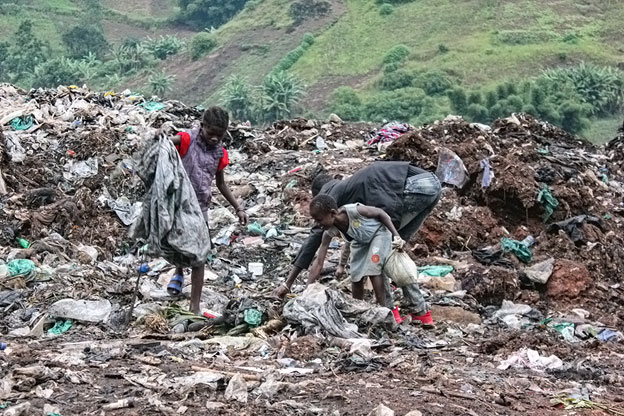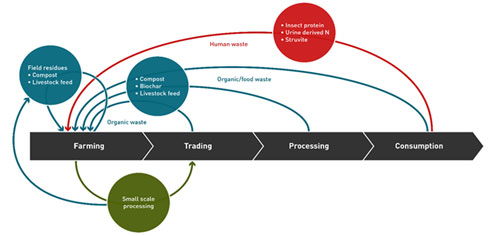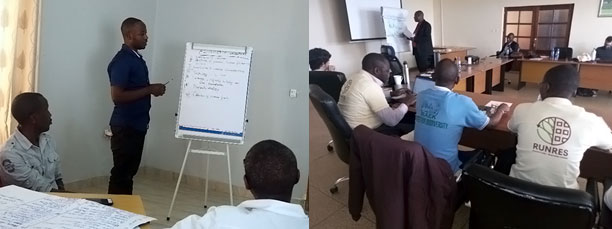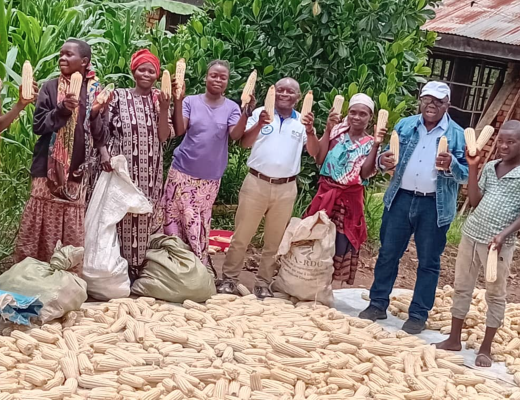The International Institute of Tropical Agriculture (IITA) in Rwanda and the Democratic Republic of Congo (DRC) along with ETH Zurich, a Swiss university, co-manage the Rural‒Urban Nexus, establishing a nutrient loop to improve the city-region food system resilience (RUNRES) project.
The RUNRES project aims to turn waste into valuable products, mainly organic manure and animal feed. Achieving this will help improve human and environmental health through enhancing cleanliness, crop/livestock productivity, food security, and household income while practicing a resource sustaining circular economy model (recycling and reusing waste in production).

Waste management is still a challenge in many African cities (source: Internet)
Under the circular economy model, food comes from the rural areas in the farmers’ fields and is consumed in urban areas. Consumption in urban areas brings along an accumulation of organic waste (crop residues, household and food waste) that, under the circular economy model, is recycled and reused in the form of fertilizer/organic manure or animal feed, in crop or livestock production.

The RUNRES Concept of a Circular Economy Model. In the CE model, nothing is wasted in the food cycle; after consumption, the waste is processed into manure and animal feed that is reused in crop/livestock production.
Currently, most of the waste produced from households while preparing food is considered as waste for dumping. The role of RUNRES is to ensure that nothing is wasted in the food value chain.
“We are looking at establishing circular economies, whereby the food waste from households, markets, and coffee washing stations can be recycled and reused in the farms to increase productivity. This will close nutrient loops, replenish our soil nutrients in Kamonyi District, Rwanda and the peri-urban Bukavu area in the Democratic Republic of Congo (DRC), through increased and cheaper use of organic fertilizers,” says Haruna Sekabira, one of the lead scientists in the RUNRES project.
As part of the progress activities, RUNRES has held several consultative meetings with local partners and stakeholders in the cassava and waste value chains in Kamonyi District, the project site in Rwanda, and Bukavu, the project site in the DRC.
From these consultations, the stakeholders have prioritized three innovations for pilot implementation under the RUNRES project in Rwanda :
- Processing cassava peel into animal feed
- Transforming human waste (latrine waste) into organic manure
- Composting household waste into organic fertilizer.
In DRC, the team also selected three innovations for RUNRES implementation:
- Processing or re-utilizing coffee waste composting
- Turning human waste (latrine waste) into organic fertilizer
- Sorting food waste and composting into organic fertilizer.
In these consultations, discussions evolved around what activities to undertake to achieve the suggested innovations and listed potential actors and partners to be involved.

Stakeholders and partners suggested several activities and partners to work with as part of the RUNRES project
Participants developed innovation plans and agreed to fine-tune these, and provide a list of activities to be undertaken and other partners to work with, and state aspects that make their innovation plans successful and worthy of RUNRES investment. The final innovation plan will be vetted and selected in mid-2020.
Farmers, government, and private sector partners optimistic
With the RUNRES project, farmers hope to generate more income from turning coffee and food waste into saleable organic manure, with the enhanced value of saleable fertilizers, which they are going to use to increase and sustain crop productivity.
“This initiative is going to add value to our cassava. It is very beneficial, as we will not lose anything in the whole production process of our cassava, including cassava peel, and wastewater from cassava washing stations. All these will be recycled and returned for reuse in our fields as compost or livestock feed,” says Jean Claude Umwizerwa, the leader of Rwanda Cassava Value Chain Platform and Cassava Farmer in Kamonyi District, Rwanda.
“The RUNRES initiative is going to alleviate the waste problem in Bukavu town,” says the Mayor, Mr Méschac Bilubi Ulengabo. “It is very beneficial, as waste for which we do not have places in the town, will be going back and be re-utilized for food production.”
RUNRES involves local and national policymakers contributing ideas on how to overcome the challenges related to waste accumulation. This way, the project ensures that these policymakers (referred to as influential stakeholders) are part of the process for later support in scaling successful innovations at both local and national levels, through enacting appropriate policies.
The RUNRES project is being implemented in DRC and Rwanda by IITA and ETH Zurich.




1 Comment
Samuel
July 20, 2020 at 9:33 amThis is a wonderful initiative, it’s the future! Turning wastes to valuable resources is the best way to eradicate pollution and other hazardous dislikes. I wish I can be part of this, just don’t know how to join. It’s really on point.